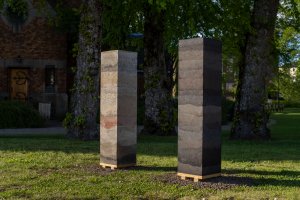Apr 12 2025
Black Earth Study Club: Land as Verb with Andros Zins-Browne, Kyle Mays, Quito Swan, Saba Innab and Zoé Samudzi
Sat | 2PM

Please join us for the final convening of the Black Earth Study Club, a series of transdisciplinary programs informed by Nolan Oswald Dennis’s exhibition, overturns, which weaves together artistic, scientific, and philosophical approaches to explore the the material and metaphysical conditions of decolonization.
Concluding the public program series, this event departs from photographer Santu Mofokeng’s proposition to consider land as a verb instead of a noun. Foregrounding this renewed orientation to land as a kind of geo-politics, scholars Kyle Mays and Quito Swan, artist and architect Saba Innab, and critic Zoé Samudzi will offer critical explorations of land dispossession and the historical and contemporary intimacies between struggles for self-determination across Africa, Europe, Asia, Oceania, and the Americas.
The afternoon will culminate in a performance on SI’s rooftop led by artist Andros Zins-Browne. Zins-Browne’s work, ground above world (after H), extends his inquiry into the relationships between bodies and ecology through an abstract language of gestures, materials, and spoken words that reflect on Blackness, property, and landlessness.
Please RSVP to rsvp@swissinstitute.net.
Black Earth Study Club is organized by KJ Abudu, Assistant Curator, Public Programs and Residencies.
Andros Zins-Browne works at the intersection of performance and dance, extending choreographic practice into encounters with dancers, nondancers, vocalists, objects, and texts. Since 2016, his performance Already Unmade has been presented at the ICA, London; Whitney Museum of American Art, New York; Rockbund Art Museum, Shanghai; and Fondation Galeries Lafayette, Paris. In 2019, Atlas Unlimited, a series of exhibitions in collaboration with artist Karthik Pandian, was featured at PERFORMA19, New York, and is currently streaming on the Criterion Channel and at Triple Canopy. His ‘vocal choreographies’ include, color a body who flees (Hammer Museum, Los Angeles, 2022) a collaborative sound installation and performance series and The Chaos Opera Workshops (Canal Projects, New York, Centre Pompidou x Jersey City, 2024)- participatory vocal performances activating the potentials for intimacy through dissonance. In collaboration with a host of conspirators, Zins-Browne premiered duel c (River-To-River Festival, 2023) and duel H (Danspace Project, 2024) in choreographies commingling care and violence.
Kyle T. Mays is an Afro-Indigenous (Saginaw Chippewa) writer and scholar of Afro-Indigenous history. He is a Professor of African American Studies, American Indian Studies, and History at the University of California Los Angeles. He is the author of four books, including An Afro-Indigenous History of the United States (2021) and Rethinking the Red Power Movement (with Sam Hitchmough, 2024).
Quito J. Swan is a scholar of Black Internationalism and is Professor of Africana Studies and History at The George Washington University. He is the author of Born A Sufferah: The Insurgent Soundscapes of Dancehall Music (Bloomsbury, 2025), Pasifika Black: Oceania, Anti-Colonialism and the African World (New York University Press, 2022), Pauulu’s Diaspora: Black Internationalism and Environmental Justice (University Press of Florida, 2020) and Black Power in Bermuda: The Struggle for Decolonization (Palgrave Macmillan, 2010). Pasifika Black received ASALH’s 2023 Best Book in African American History Award and Pauulu’s Diaspora won the AAIHS’s 2022 Pauli Murray Book Prize. Swan has published in journals like the Radical History Review, the Journal of Civil and Human Rights, and the Journal of African American History.
The multidisciplinary practice of Palestinian Jordanian artist, architect and urban researcher Saba Innab spans across historical research, drawing, mapping, model-making, and spatial interventions. In 2019, she co-founded OPPA, a research and architecture collective based in Amman. Her architectural practice includes working on the reconstruction of Nahr el Bared Palestinian refugee Camp in the North of Lebanon, a project nominated for the Aga Khan Award for Architecture, 2013. In 2014, she has received the visiting research fellowship from Studio X Amman and Columbia GSAPP. Innab’s exhibitions include: Transition Exhibition, Brücke Museum/ kunsthaus Dahlem, Berlin, 2021; 57th edition of Carnegie International, Carnegie Museum, Pittsburgh, 2018; Biennale d’Architecture d’Orléans, Frac Centre-Val de Loire, Orléans, 2017; and her solo exhibitions include: Tread Lightly- Leave No Trace, daadgalerie, Berlin, 2023; Station Point, ifa-Galerie, Berlin, 2019; and Al Rahhalah, Marfa’, Beirut, 2016. Innab was a DAAD Artists-in-Berlin fellow for 2020 – 2021. Innab lives between Amman and Beirut.
Zoé Samudzi is the Charles E. Scheidt Visiting Assistant Professor of Genocide Studies and Genocide Prevention at the Strassler Center for Holocaust and Genocide Studies at Clark University. She is also a Global Blackness Research Fellow at the Johannesburg Institute for Advanced Studies at the University of Johannesburg and a fellow with African Museums and Heritage Restitution. Her research is primarily concerned with the material and memoriological afterlives of genocide and coloniality, visuality, and the spatialities of racecraft and dispossession. Samudzi is an art critic and writer, as well as an associate editor with Parapraxis Magazine.
Image: Nolan Oswald Dennis, Xenolith Field, 2021. Photo by Hendrik Zeitler.
